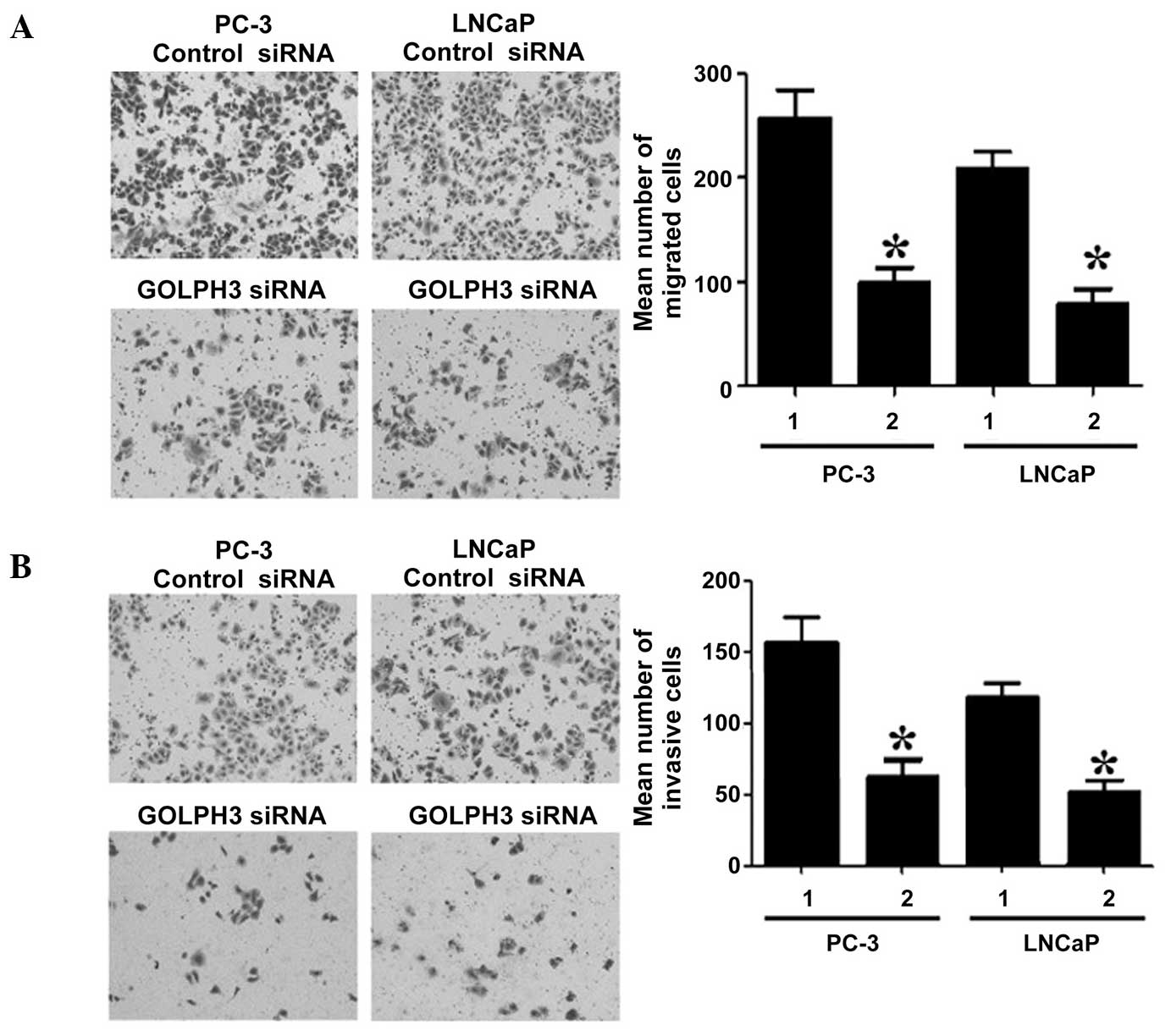|
1
|
Denmeade SR and Isaacs JT: Development of
prostate cancer treatment: the good news. Prostate. 58:211–224.
2004. View Article : Google Scholar : PubMed/NCBI
|
|
2
|
Sarkar D, Lebedeva IV, Su ZZ, et al:
Eradication of therapy-resistant human prostate tumors using a
cancer terminator virus. Cancer Res. 67:5434–5442. 2007. View Article : Google Scholar : PubMed/NCBI
|
|
3
|
Siegel R, DeSantis C, Virgo K, Stein K,
Mariotto A, Smith T, Cooper D, Gansler T, Lerro C, et al: Cancer
treatment and survivorship statistics, 2012. CA Cancer J Clin.
62:220–241. 2012. View Article : Google Scholar : PubMed/NCBI
|
|
4
|
Hull GW, Rabbani F, Abbas F, Wheeler TM,
Kattan MW and Scardino P: Cancer control with radical prostatectomy
alone in 1,000 consecutive patients. J Urol. 167:528–534. 2002.
View Article : Google Scholar : PubMed/NCBI
|
|
5
|
Patel AR and Stephenson AJ: Radiation
therapy for prostate cancer after prostatectomy: adjuvant or
salvage? Nat Rev Urol. 8:385–392. 2011. View Article : Google Scholar : PubMed/NCBI
|
|
6
|
Mishra MV, Champ CE, Den RB, Scher ED,
Shen X, Trabulsi EJ, Lallas CD, Knudsen KE, Dicker AP and Showalter
TN: Postprostatectomy radiation therapy: an evidence-based review.
Future Oncol. 7:1429–1440. 2011. View Article : Google Scholar : PubMed/NCBI
|
|
7
|
Chang AJ, Autio KA, Roach M III and Scher
HI: High-risk prostate cancer-classification and therapy. Nat Rev
Clin Oncol. 11:308–323. 2014. View Article : Google Scholar : PubMed/NCBI
|
|
8
|
Swanson GP and Basler JW: Prognostic
factors for failure after prostatectomy. J Cancer. 2:1–19.
2010.
|
|
9
|
Crawford ED, Bennett CL, Andriole GL,
Garnick MB and Petrylak DP: The utility of prostate-specific
antigen in the management of advanced prostate cancer. BJU Int.
112:548–560. 2013. View Article : Google Scholar : PubMed/NCBI
|
|
10
|
Scott KL, Kabbarah O, Liang MC, Ivanova E,
Anagnostou V, et al: GOLPH3 modulates mTOR signalling and rapamycin
sensitivity in cancer. Nature. 459:1085–1090. 2009. View Article : Google Scholar : PubMed/NCBI
|
|
11
|
Kunigou O, Nagao H, Kawabata N, Ishidou Y,
Nagano S, et al: Role of GOLPH3 and GOLPH3L in the proliferation of
human rhabdomyosarcoma. Oncol Rep. 26:1337–1342. 2011.PubMed/NCBI
|
|
12
|
Li XY, Liu W, Chen SF, Zhang LQ, Li XG and
Wang LX: Expression of the Golgi phosphoprotein-3 gene in human
gliomas: a pilot study. J Neurooncol. 105:159–163. 2011. View Article : Google Scholar : PubMed/NCBI
|
|
13
|
Romanuik TL, Wang G, Holt RA, Jones SJ,
Marra MA and Sadar MD: Identification of novel androgen-responsive
genes by sequencing of LongSAGE libraries. BMC Genomics.
10:4762009. View Article : Google Scholar : PubMed/NCBI
|
|
14
|
Abraham RT: GOLPH3 links the Golgi network
to mTOR signaling and human cancer. Pigment Cell Melanoma Res.
22:378–379. 2009. View Article : Google Scholar : PubMed/NCBI
|
|
15
|
Zeng Z, Lin H, Zhao X, Liu G, Wang X, Xu
R, Chen K, Li J and Song L: Overexpression of GOLPH3 promotes
proliferation and tumorigenicity in breast cancer via suppression
of the FOXO1 transcription factor. Clin Cancer Res. 18:4059–4069.
2012. View Article : Google Scholar : PubMed/NCBI
|
|
16
|
Steuber T, Erbersdobler A, Graefen M,
Haese A, Huland H and Karakiewicz PI: Comparative assessment of the
1992 and 2002 pathologic T3 substages for the prediction of
biochemical recurrence after radical prostatectomy. Cancer.
106:775–782. 2006. View Article : Google Scholar : PubMed/NCBI
|
|
17
|
Li H, Guo L, Chen SW, Zhao XH, Zhuang SM,
Wang LP, Song LB and Song M: GOLPH3 overexpression correlates with
tumor progression and poor prognosis in patients with clinically N0
oral tongue cancer. J Transl Med. 10:1682012. View Article : Google Scholar : PubMed/NCBI
|
|
18
|
Zhou J, Xu T, Qin R, et al: Overexpression
of Golgi phosphoprotein 3 (GOLPH3) in glioblastoma multiforme is
associated with worse prognosis. J Neurooncol. 110:195–203. 2012.
View Article : Google Scholar : PubMed/NCBI
|
|
19
|
Hua X, Yu L, Pan W, Huang X, Liao Z, Xian
Q, Fang L and Shen H: Increased expression of Golgi phosphoprotein
3 is associated with tumor aggressiveness and poor prognosis of
prostate cancer. Diagn Pathol. 7:1272012. View Article : Google Scholar
|
|
20
|
Wang JH, Chen XT, Wen ZS, Zheng M, Deng
JM, Wang MZ, Lin HX, Chen K, Li J, et al: High expression of GOLPH3
in esophageal squamous cell carcinoma correlates with poor
prognosis. PLoS One. 7:e456222012. View Article : Google Scholar : PubMed/NCBI
|
|
21
|
Hu BS, Hu H, Zhu CY, Gu YL and Li JP:
Overexpression of GOLPH3 is associated with poor clinical outcome
in gastric cancer. Tumor Biol. 34:515–520. 2013. View Article : Google Scholar
|


















